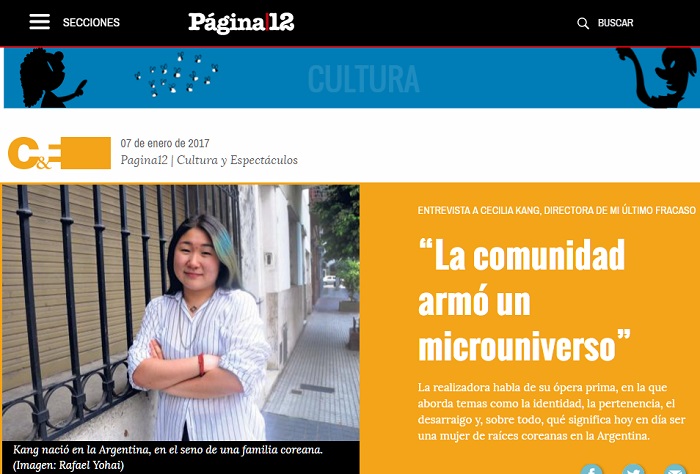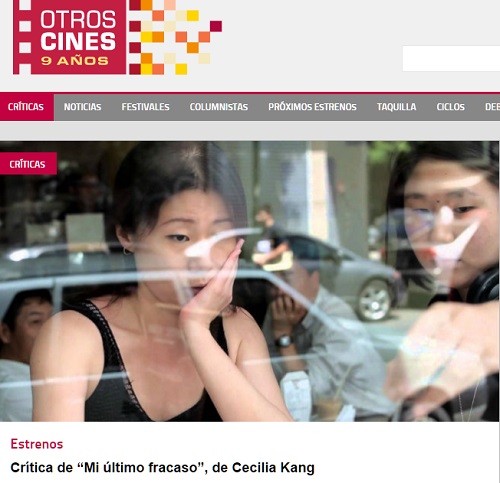“I wanted to talk about the sort of connection that forms between the two different cultures, of Korea and Argentina, when they both coexist.”
This is how Cecilia Kang, a Korean-Argentine, describes it in her documentary film, a work in which she describes what it's like to live as a woman of Korean descent in today’s Argentina. The film is titled “My Last Failure," or " Mi último fracaso," (나의 마지막 실패), and premiered on Jan. 7 at the Museum of Latin American Art in Buenos Aires.

Born in 1985 in Argentina to a Korean immigrant family, director Kang has since lived there in the South American country. Throughout her 32-year life in Argentina, Kang has faced countless challenges, including cultural differences and language barriers, but has also managed to adapt to the society that she had to face. Nonetheless, Kang says that she still feels a sense of “Koreaness” deep in her heart.
The “continuity of her roots in Korea,” she said, led her to make “My Last Failure.” In the work, Kang sheds new light on the Korean community that flowers across Argentina, as seen through the eyes of her family members and acquaintances. In particular, her biological sister, Catalina Kang, and formative arts professor Kim Ran, appear in the film. The director called the pair “individuals who aren't bound by conventional roles for Korean women, or the rules required by society here” and “individuals who best embody the sprawling competition of two different cultures.”
Through the eyes of the two of her closest people and through the eyes of friends who she calls “the very testament to typical Korean-Argentine people,” the director shone some light on the cultural intersection where women of Korean descent who live in Argentina now find themselves.
Kang’s film has captured the eyes of the Argentine media, too. On Jan. 7, the newspaper Pagina 12 published a story about Kang and her work, under the title of “The [Korean] community forms a micro-universe [in Argentina],” or "La comunidad armó un microuniverso."
“The director must have felt a sense of tension that sparked between her original world and the new world to which she had to adapt. We believe that experience must have led her to start working on the film,” the newspaper said.
Kang said in an interview with the newspaper that, “The Korean community seemed a bit different in the old days, than it is now, in a way in which it was too conservative, and male, and chauvinist in many ways. Korean immigrants of my parents’ generation had to shape their future here in Argentina, totally different from their homeland in many ways. The only thing that they turned to for their survival was to catch up on customs, the language and traditions here.”
“The first time I showed my friends the complete documentary, they seemed confused about whether it was filmed in Argentina or Korea. That’s what I intended to show: the borderlessness of two different cultures,” the director said.

Otros Cines, an Argentine movie magazine, lauded the film, saying, “The way in which it views and portrays Korean-Argentine women is interesting. You step as far back as possible to observe every beautiful moment of their lives in their own world.”
By Sohn JiAe
Korea.net Staff Writer
Photos: Pagina 12, Otros Cines
jiae5853@korea.kr
This is how Cecilia Kang, a Korean-Argentine, describes it in her documentary film, a work in which she describes what it's like to live as a woman of Korean descent in today’s Argentina. The film is titled “My Last Failure," or " Mi último fracaso," (나의 마지막 실패), and premiered on Jan. 7 at the Museum of Latin American Art in Buenos Aires.

The Argentine newspaper Pagina 12 sat down with Korean-Argentine Cecilia Kang who recently directed the documentary ‘My Last Failure.’ The Jan. 7 article talks about how the director looked at the Korean community in Argentina, as well as what message she tried to send with the production.
Born in 1985 in Argentina to a Korean immigrant family, director Kang has since lived there in the South American country. Throughout her 32-year life in Argentina, Kang has faced countless challenges, including cultural differences and language barriers, but has also managed to adapt to the society that she had to face. Nonetheless, Kang says that she still feels a sense of “Koreaness” deep in her heart.
The “continuity of her roots in Korea,” she said, led her to make “My Last Failure.” In the work, Kang sheds new light on the Korean community that flowers across Argentina, as seen through the eyes of her family members and acquaintances. In particular, her biological sister, Catalina Kang, and formative arts professor Kim Ran, appear in the film. The director called the pair “individuals who aren't bound by conventional roles for Korean women, or the rules required by society here” and “individuals who best embody the sprawling competition of two different cultures.”
Through the eyes of the two of her closest people and through the eyes of friends who she calls “the very testament to typical Korean-Argentine people,” the director shone some light on the cultural intersection where women of Korean descent who live in Argentina now find themselves.
Kang’s film has captured the eyes of the Argentine media, too. On Jan. 7, the newspaper Pagina 12 published a story about Kang and her work, under the title of “The [Korean] community forms a micro-universe [in Argentina],” or "La comunidad armó un microuniverso."
“The director must have felt a sense of tension that sparked between her original world and the new world to which she had to adapt. We believe that experience must have led her to start working on the film,” the newspaper said.
Kang said in an interview with the newspaper that, “The Korean community seemed a bit different in the old days, than it is now, in a way in which it was too conservative, and male, and chauvinist in many ways. Korean immigrants of my parents’ generation had to shape their future here in Argentina, totally different from their homeland in many ways. The only thing that they turned to for their survival was to catch up on customs, the language and traditions here.”
“The first time I showed my friends the complete documentary, they seemed confused about whether it was filmed in Argentina or Korea. That’s what I intended to show: the borderlessness of two different cultures,” the director said.

Otros Cines, an Argentine film magazine, describes in its Jan. 7 article Korean-Argentine director Cecilia Kang’s documentary ‘My Last Failure’ as being ‘simple and lovely.’
Otros Cines, an Argentine movie magazine, lauded the film, saying, “The way in which it views and portrays Korean-Argentine women is interesting. You step as far back as possible to observe every beautiful moment of their lives in their own world.”
By Sohn JiAe
Korea.net Staff Writer
Photos: Pagina 12, Otros Cines
jiae5853@korea.kr